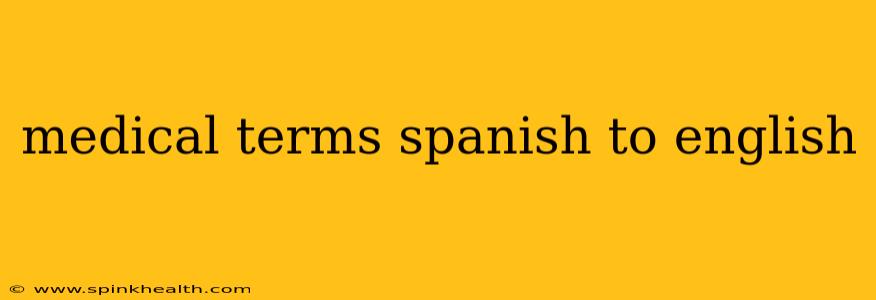Decoding the Doctor: A Journey Through Common Spanish Medical Terms
Imagine this: you're traveling in a Spanish-speaking country, and suddenly, you need medical attention. The doctor speaks rapidly, using terms you don't understand. Panic sets in. This scenario, while potentially stressful, highlights the importance of understanding common Spanish medical terms. This guide will embark on a journey through some frequently used terms, easing your anxieties and empowering you with knowledge.
We'll explore various medical specialties, common ailments, and essential vocabulary, making your next trip (or even everyday life if you work with Spanish-speaking patients) a little smoother. Let's begin!
Common Medical Specialties (Especialidades Médicas)
- Cardiología: Cardiology (heart)
- Oncología: Oncology (cancer)
- Neurología: Neurology (nervous system)
- Pediatría: Pediatrics (children)
- Ginecología: Gynecology (women's health)
- Dermatología: Dermatology (skin)
- Oftalmología: Ophthalmology (eyes)
- Urología: Urology (urinary system)
- Cirugía: Surgery
- Medicina Interna: Internal Medicine
Common Ailments and Symptoms (Enfermedades y Síntomas)
- Dolor de cabeza: Headache
- Fiebre: Fever
- Tos: Cough
- Dolor de garganta: Sore throat
- Dolor de estómago: Stomach ache
- Náuseas: Nausea
- Vómitos: Vomiting
- Diarrea: Diarrhea
- Estreñimiento: Constipation
- Dolor de espalda: Back pain
- Dolor de pecho: Chest pain
- Dificultad para respirar: Difficulty breathing
- Mareos: Dizziness
- Desmayo: Fainting
- Alergia: Allergy
- Infección: Infection
- Fractura: Fracture
- Herida: Wound
Body Parts (Partes del Cuerpo)
- Cabeza: Head
- Cuello: Neck
- Hombro: Shoulder
- Brazo: Arm
- Mano: Hand
- Pierna: Leg
- Pie: Foot
- Corazón: Heart
- Pulmones: Lungs
- Estómago: Stomach
- Hígado: Liver
- Riñones: Kidneys
Frequently Asked Questions (Preguntas Frecuentes)
What are some common Spanish words for "medicine"?
The word for "medicine" in Spanish depends on the context. "Medicina" refers to the field of medicine or a type of remedy. "Medicamento" refers to a specific drug or medication. "Remedio" is a more general term for a cure or remedy, often homeopathic or herbal.
How do I say "I have a..." in Spanish?
You would typically use the verb "tener" (to have) followed by the ailment. For example:
- Tengo dolor de cabeza: I have a headache.
- Tengo fiebre: I have a fever.
- Tengo tos: I have a cough.
What are some crucial phrases for a medical visit?
Learning a few key phrases can be invaluable during a medical visit:
- Necesito un médico: I need a doctor.
- Tengo mucho dolor: I am in a lot of pain.
- ¿Me puede ayudar?: Can you help me?
- No entiendo: I don't understand.
- Por favor, llame a un intérprete: Please call an interpreter.
This is just a starting point. The world of medical terminology is vast, but by learning even these basic terms, you can significantly improve communication during medical emergencies or routine checkups in Spanish-speaking environments. Remember, clear communication is crucial for effective healthcare. Further research into specific areas of concern, like cardiology or oncology terms, can further enhance your understanding and preparedness.

